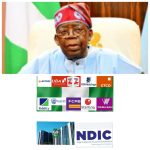By Barnabas Esiet .
Economic experts and analysts have identified internal contradictions, conflicting policies, and a bias against domestic production as major impediments to Nigeria’s economic progress.
Despite government rhetoric emphasising growth and investment, policies often favour foreign capital and short-term financial inflows over long-term industrial development.
Successive administrations have treated Foreign Direct Investment (FDI) as the ultimate measure of economic success. Yet, the overreliance on foreign capital has often come at the expense of domestic industrial growth.
Instead of strengthening local value chains, government policy frameworks tend to prioritise the comfort of foreign investors by offering them tax holidays, import waivers, and relaxed regulations, while indigenous manufacturers are left to fend for themselves.
According to data from Lloyds Bank Trade and Macrotrends, Nigeria’s foreign direct investment (FDI) experienced a significant surge, rising from $895 million in 2022 to $1.87 billion in 2023 and dipping slightly to $1.08 billion in 2024.
Foreign multinationals further enjoy an unfair competitive edge over local producers. Many of these companies import finished goods and raw materials from their home bases without going through the stress of currency exchange and other bottlenecks.
In the process, they avoid local taxes, access cheaper credit abroad, and price their products lower than what the local producers can afford.
This creates a market imbalance that sidelines Nigerian firms. The lack of effective industrial policy or protection for domestic producers has turned the Nigerian market into a playground for foreign brands while local factories shut down in droves.
This policy tilt has weakened Nigeria’s manufacturing base. Local manufacturers struggle with inadequate power supply, poor infrastructure, insecurity, unfair competition and high production costs, while imported goods flood the market.
The result is an economy rich in potential but poor in actual production by being dependent on imports, even for goods it can produce locally.
Data from the Nigerian Investment Promotion Commission (NIPC) indicates that at least 39.65 million micro, small, and medium enterprises (MSMEs) operating in Nigeria as of December 2021 contributed 48% to Nigeria’s national GDP and account for 96% of businesses and 84% of employment in Nigeria.
The 2025 Small Business Statistics by Moniepoint shows that 7.2 million MSMEs shut down between 2023 and 2024, representing 30% of Nigeria’s estimated 24 million MSMEs while the country suffered N94 trillion estimated economic loss due to multinational divestments and business closures during the same period.
This vital sector requires an estimated $32.2 billion in financing. Nigeria’s bank loan-to-GDP ratio is rated among the lowest in Sub-Saharan Africa, highlighting a significant mismatch between the banking sector’s reported growth and the real economy’s requirements.
According to the World Bank, domestic credit to the private sector as a percentage of GDP can be used to gauge the banking sector’s contribution to the economy.
Instead of stimulating economic growth with lending, these Nigerian banks tend to be more focused on profit maximisation.
Nigeria’s bank loans to GDP ratio is relatively low compared to other countries. Data from the World Bank shows that bank loans to GDP ratio in Nigeria is around 12%, which is relatively low compared to other countries.
In the first quarter of 2023, credit issued to the Nigerian private sector stood at N43 trillion (US$28.98 million).
Whereas, Morocco’s bank loans to GDP ratio was approximately 58.51% in 2023.This ratio represents domestic credit to the private sector as a percentage of GDP.
With commercial bank lending rates often exceeding 30 percent, productive borrowing has become nearly impossible in Nigeria.
High interest rates, though meant to control inflation, have strangled real sector investment, thereby leaving manufacturers, MSMEs, and startups gasping for affordable financing.
Nigeria’s interest rate trends have mirrored the economy’s volatility and the Central Bank’s policy inconsistency.
The Monetary Policy Rate (MPR), which is a key determinant of lending rates, has oscillated widely, often punishing producers more than speculators.
The Buhari years (2015-2023) saw a tightening stance, with the rate peaking at 18.75 percent in 2023 as inflation surged. In 2024-2025, the CBN raised the MPR further to 26.25 percent, one of the highest in Nigeria’s democratic history.
Despite the launch of numerous intervention funds to support industries and MSMEs in Nigeria, many of these initiatives have been frustrated by issues.
The N220 billion MSME Development Fund, N300 billion Real Sector Support Facility, and N200 billion SME Restructuring and Refinancing Fund were meant to boost small businesses and farmers.
Schemes like the Anchor Borrowers’ Programme and Agribusiness/Small and Medium Enterprises Investment Scheme have been marred by allegations of abuse, ghost beneficiaries, and poor loan recovery.
A 2023 report by the Auditor General revealed that billions of naira from these schemes were either unaccounted for or misapplied, with funds channeled through commercial banks and other intermediaries that prioritise profit over impact.
Many genuine entrepreneurs claim they were unable to access the funds, while others question the transparency of disbursement.
The Central Bank of Nigeria and Bank of Industry have spearheaded these initiatives, but the outcomes have been disappointing.
The Survival Fund, though lauded in principle, has so far delivered roughly N67.5 billion to over 1.25 million beneficiaries, in some cases mobilisation fees were allegedly collected but goods or services never followed.
A N5 billion SME loan fund channeled through SMEDAN and Sterling Bank has seen only N250 million actually credited to the business owners.
Even in interventions like that of BOI’s N75 billion Manufacturing Sector Fund, less than a third has been disbursed to manufacturers, as many applications are still awaiting approval.
These examples speak not to scarcity of funds, but to failures in administration, accountability, and access.
The Bank of Industry (BoI) and other administering agencies have also faced scrutiny for lack of transparency and bureaucratic delays, making it difficult for genuine producers to access support.
An industrial analyst, Caulcrik Akiyele, believes that redirecting intervention funds towards consumer credit schemes could be a more productive approach.
This would enable Nigerians to purchase locally made products, ultimately driving down manufacturers’ inventories and boosting the economy.
“We just got it all wrong. Most of the recipients of the intervention funds diverted the funds into unproductive ventures. We ought to have used those funds for a consumer credit scheme to buy only locally made products.
“Such would have given velocity to the inventories of the recipients of those funds instead and would have had better effects towards industrialisation.” He said.
The persistent contradictions in government policies have taken a heavy toll on Nigeria’s productive landscape.
Over the years, millions of small and medium-scale enterprises (SMEs) have folded under the weight of poor policy coordination, multiple taxation, and an unfriendly operating environment.
According to reports by SMEDAN and independent research bodies, more than two million SMEs collapsed between 2017 and 2021, with another two million shutting down between 2019 and 2021.
The number of small-scale industrialists also fell from 246,200 in 2020 to 170,098 in 2022. The trend worsened between 2023 and 2024, when about 7.2 million MSMEs, nearly 30 percent of Nigeria’s estimated 24 million small businesses, closed shop.
In manufacturing alone, official data shows that 767 companies shut down in 2023, while 335 others became distressed, unable to sustain operations amid rising costs and dwindling demand.
These closures translate into millions of lost jobs, disrupted supply chains, and weakened industrial capacity and economic growth.
Some foreign companies that have divested from Nigeria in recent years include: Shell – that sold its onshore oilfields for $2.4 billion, GlaxoSmithKline Consumer Nigeria which exited after 51 years of operation in Nigeria. Others are; Procter & Gamble, Unilever Nigeria, Sanofi and Bolt Foods.
The long-term implication of this situation is dire, showing a shrinking productive base, growing unemployment, and deepening poverty.
As more factories and small businesses diminish, the economy becomes increasingly import-dependent, eroding Nigeria’s capacity to create wealth internally and undermining its prospects for sustainable growth.
Meanwhile, local producers are confronted with high production costs, unreliable power supply, and unstable input prices, making their goods more expensive and less attractive in the market.
Businesses in Nigeria also face a crushing burden of multiple taxation from federal, state, and local authorities all imposing various levies, fees, and charges.
The government on its part also contributes to the problem through poor patronage of locally made goods.
The Nigeria First Policy – a groundbreaking initiative aimed at transforming the country’s economy by prioritising local industries, talent, and resources – is targeted at giving preference to Nigerian-made goods and services.
The policy seeks to boost domestic production, create jobs, enhance the nation’s economic resilience, reduce dependence on foreign goods, foster a culture of self-reliance and stimulate economic growth.
However, despite this bold move, many public institutions and officials prefer foreign brands, from vehicles to office equipment.
An Economist and the CEO of the Centre for the Promotion of Private Enterprise (CPPE), Dr Muda Yusuf, believes that the Nigeria First Policy presents a transformational opportunity to reposition the country’s economy.
In his words, “Prioritising local firms, talent, and innovation will increase economic inclusion and ensure that the benefits of growth are broadly shared across regions and communities.”
The president of the Manufacturers Association of Nigeria (MAN),Francis Meshioye, has gone a step further calling on the Federal Government to designate an annual “Proudly Nigeria Day” to promote local consumption and boost the country’s economy.
According to Meshioye, the special day would serve as a national economic reflection, fostering behavioral change and renewing national pride in Made-in-Nigeria products.
To achieve the expected outcomes, Dr. Yusuf strongly recommends the establishment of a dedicated monitoring and compliance body to strengthen existing institutions to enforce policy adherence, track performance, and ensure transparency.
To unlock true productivity and achieve sustainable growth, Nigeria’s policies must prioritise empowering domestic production. This requires reducing interest rates on productive loans and improving access to long-term credit to support businesses.
Additionally, streamlining taxes and eliminating multiple levies that discourage small businesses will help foster a more favorable business environment.
Protecting local industries through fair trade policies and preferential procurement practices will also be crucial. Furthermore, strengthening transparency in the management of industry support funds will ensure effective utilisation.
Nigerian banks should adopt a more strategic approach to financial intermediation, directing financial resources towards productive activities that stimulate economic development.
This entails a paradigm shift in credit evaluation, prioritising business potential and cash flow viability over collateral-based lending.
Furthermore, partnerships with fintech and development institutions can facilitate the use of data-driven credit assessments, enabling banks to expand their outreach to small manufacturers, agribusinesses, and innovators who are key drivers of economic growth.
Finally, promoting the consumption of made-in-Nigeria goods across all levels of government and society will drive demand and stimulate production, ultimately driving economic growth and creating opportunities for citizens.
Above all, government must stop considering foreign investment as a substitute for domestic capacity development.
Real growth will come when the country begins to build from within by supporting its entrepreneurs, protecting its industries, and channeling its resources into productive use rather than speculative ventures.
**Barnabas Esiet can be reached via: barninest@gmail.com









Comment here